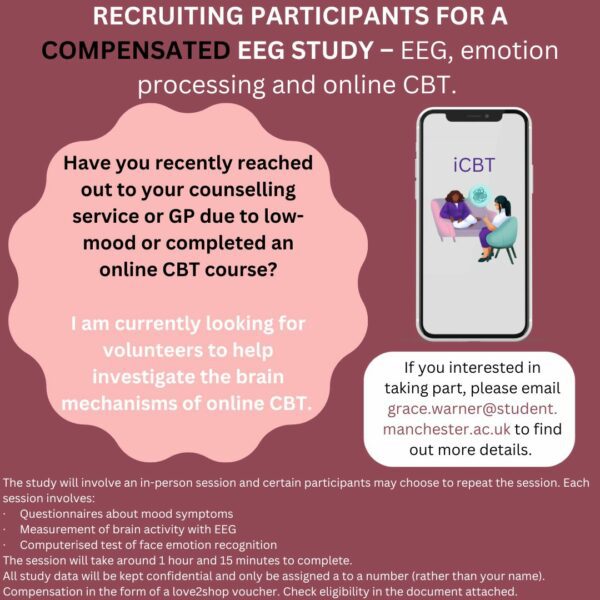The virtual therapist: Could online CBT revolutionise mental health care?
By gracewarner

In today’s increasingly virtual world, is there a way to use the internet to positively influence mental health? Internet-administered Cognitive Behavioural Therapy (iCBT) is a modern-day therapy which uses technology to provide an intervention for mild to moderate mental health issues including depression and anxiety.
UoM and the modern day mental health crisis
Depression is a debilitating psychological disorder which affects one in five adults over the age of 20. Alongside anxiety, it is one of the most commonly diagnosed mental health problems among students.
University life brings exciting opportunities but also introduces novel stressors that can test your resilience. These can arise at any stage of your degree, with social pressures, deadlines and finances often providing a perfect medium to cultivate mental health issues.
In addition, depression often causes sufferers to withdraw from their daily routines, impacting their engagement in their studies and social life. Unsurprisingly, these responses can further worsen one’s negative experience.
So, when it all gets too much, what does our University offer to lend a helping hand? Often, it’s access to the University’s Counselling & Mental Health service, which offers face-to-face appointments with counsellors, mental health practitioners and social prescribers.
They can offer, amongst other things, a space for you to discuss your struggles and feelings. The service practitioners come from a variety of psychological and professional backgrounds and are equipped to help service users develop strategies and skills to tackle their concerns.
Service users are also directed to resources outside of face-to-face appointments such as self-help resources, therapy groups or psychoeducation workshops. The service can also refer students that need further support to a specialist CBT clinic, help them access NHS services, or guide them to other specialist third-sector services. They can support these individuals during any time spent on waiting lists.
The University also has a partnership with Health Assured, which provide a well-being app and a 24/7 counselling and advice helpline.
Counsellors provide an invaluable service to many students and deserve to be recognised and appreciated for their work. However, although there is no current official measure of waiting times, the counselling system is overstretched. Appointments are released at four p.m. every day and are typically accessible on a first-come-first-served basis, with many students struggling to get seen.
Additionally, the counselling service cannot offer long-term care due to long university holidays and the typical 3-4 years duration of courses. The modern-day mental health crisis is overpowering available resources and demands modern solutions.
What even is iCBT? How the Internet can provide mental health interventions
Access to mental health care is of paramount importance, but hurdles such as associated stigma, under-resourced services and increasing demands are resulting in narrowing options for those in need of mental health help. With 25% of mental health patients waiting more than 12 weeks on the NHS for psychological treatments, iCBT may provide a solution for sufferers of mild to moderate levels of depression and anxiety.
iCBT is typically organised into blocks or modules of online materials, such as videos, providing psychological interventions with ‘homework tasks’ typical of psychological treatments to complete between modules. Questionnaires are also sent to measure progress. Some iCBT courses also include contact with a therapist, either synchronously or asynchronously.
Initial reactions to hearing about iCBT are often negative, with people feeling that a computer cannot provide compassionate care in the same way as a human. However, for mild to moderate levels of depression, iCBT has been shown to improve symptoms of depression to an equal extent as that of face-to-face CBT.
Research suggests that use of the resource, either as a sole treatment or whilst waiting for NHS treatments, can lead to long-term change. The setup means the resources can remain available for a lifetime, and it is also far more accessible than other forms of treatment. Therapy can take place anywhere, at any time.
These factors mean that iCBT could have a major impact on services supporting mental health in the midst of the present mental health crisis, including the University Counselling Service. iCBT is already accessible to some Manchester-based students, with Manchester Metropolitan University offering the use of SilverCloud, an iCBT course.
The University of Manchester could further acknowledge its responsibility to cushion and care for students’ mental health by providing as many routes of access to help as possible.
Interested in iCBT and want to get involved?
If you are interested in furthering research into iCBT, UoM is currently looking for volunteers to take part in a study investigating the neural effects of online CBT as a treatment for depression. Please see the poster below for more details:









